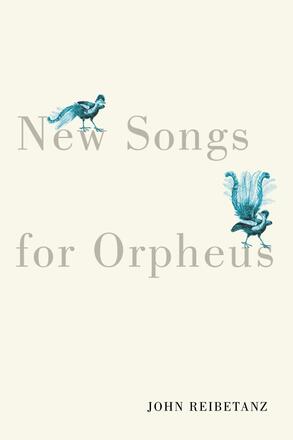
New Songs for Orpheus
Poems that update Ovid’s Metamorphoses and explore the transformations he would depict if he lived in the twenty-first century.
Description
For a change Orpheus / listens to the other / musicians once the hum / of his lyre no longer / hangs like moss from branches / in the forest air
In New Songs for OrpheusJohn Reibetanz updates Ovid’s poetry. Ovid’s words showed him to be a person of deep empathy for natural, animal, and human worlds, and so Reibetanz posits that the Roman writer would likely be eager to take account of all that we have learned about them in the past two thousand years.
Ovid would be familiar with recent discoveries about the complex inner lives and societies of non-human animals, and about the intricate interrelationships sustained in forests. The poems in New Songs for Orpheus look at and listen to the real creatures into which Ovid’s characters were transformed, acts viewed not as punishment or deprivation, but as a release into other intriguing forms of life. In the human realm, he might find a suitably cataclysmic counterpart to the Trojan War in the barbarities and sacrifices of World War II, or perhaps see an analogue to the Fall of Troy in the fall of the Two Towers in September 2001.
The songs Orpheus sings then transform into more contemporary shapes, as characters and incidents from the Canadian musical Come from Away – like those in Ovid’s “restored” world after the flood – are celebrated in a reaffirmation of community after the divisive horrors of 9/11. In all these times and places, metamorphosis brings new meaning into a life, be it human, plant, or animal.
Reviews
“What delight! John Reibetanz elegantly updates Ovid in poems that reach beyond encounters between gods and mortals to haul the more-than-human world to our attention. Here’s Orpheus listening “[f]or a change … / to the other / musicians” as he sinks into and through grief’s underworld where he “picks up his lyre again / and sings the song of breath … “ From these depths Orpheus sings the world, and the world sings back with specifics of plumage and blossom, feather and stone, flight and appetite — details brilliant and till now hardly noticed. Here are songs that bear witness to the matter we are and its ongoingness: “… everything alive is borne / on a river of matter / changing from one identity / to another …” Fluent, riverine, rife with mortality and mutability, Reibetanz’s poems tumble, shift, flow, ring changes, while time expands and contracts and expands again. If Ovid is the spring from which these songs rise, the Tao is the deeper current they ride.” Maureen Scott Harris
“Reibetanz takes moments from Metamorphoses and creates rich natural worlds around them, often linking the power of myth with the power of animals.” Quill & Quire
“With these remarkable poems, John Reibetanz brings an ecopoetic sensibility sensibility to Ovid’s Myths of Metamorphosis, celebrating the “true metamorphosis” that occurs everywhere in the natural world, independent of the malign whims of gods and the selfish designs of humans. Working playfully, and playfully working, rich with music and wit, these poems extend our understanding of deep change. As usual with Reibetanz, imaginative reach blends with probing intelligence. Ovid supplies an ancient springboard for a poetic investigation of transformation that – given our circumstances – could not be more timely.” Don Mackay